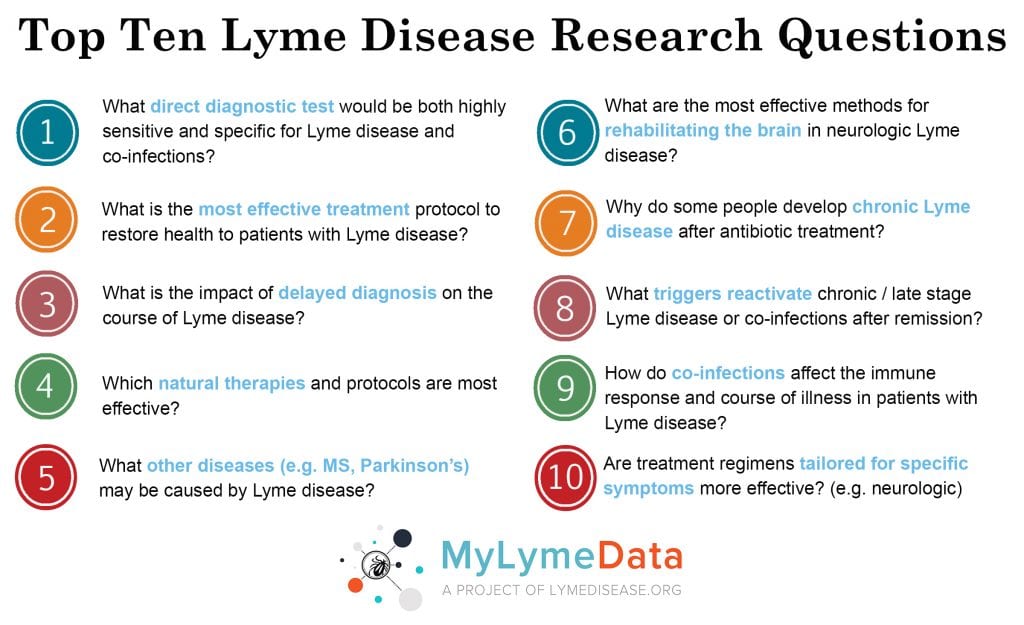Number one research priority for Lyme disease? Better testing.

Press release:
LymeDisease.org releases “Top 10 Lyme Disease Research Questions,” as federal government weighs options in fight against growing epidemic.
The nation’s top research priority for Lyme disease should be finding a more accurate and sensitive diagnostic test.
That’s the conclusion of a broad-based collaboration of researchers, treating physicians, and Lyme disease patients in the United States, who took part in a comprehensive priority-setting process over the past two years.
Other priorities for Lyme research identified by the group include finding more effective treatments for both early and late stages of the disease, and determining why some patients develop a chronic form of the illness.
Lyme disease, a bacterial infection transmitted by the bite of a tick, can be difficult to diagnose and treat. Furthermore, many patients diagnosed with Lyme disease remain ill after treatment, while others improve.
LymeDisease.org, which advocates nationally for Lyme disease patients, recently released the results of the process, “The Top Ten Lyme Disease Research Questions.”
According to CEO Lorraine Johnson, lab testing for Lyme disease is unreliable, making it difficult for patients to get appropriately diagnosed.
She also said there has been very little research into treatment options for those who remain ill after initial therapy.
“People with Lyme disease have the most at stake here. Yet they have traditionally had little or no say about where researchers choose to focus their efforts,” said Johnson.
“We undertook this broad and inclusive process to include patients in setting the research priorities for Lyme disease.”
Between 2015 and 2017, LymeDisease.org completed a three-step process based loosely on the one developed by the prestigious James Lind Alliance to define national research priorities.
The first round of priority setting took place at a 2015 conference held by the American Association for the Advancement of Science. At that forum, 50 physicians, researchers, and patients developed a list of high priority questions for Lyme disease.
Then, LymeDisease.org invited participants of the MyLymeData patient registry to rank the priorities established at the AAAS conference, and to submit additional questions as well. This became the second list.
Next, the organization surveyed more than 5,000 members of the Lyme community at large. They were asked to rank the second list, and thus establish the final list of top ten research priorities.
Over 7,000 patients, researchers, physicians, and advocacy groups participated in the process, which will be used to influence research agendas—particularly for government-funded research.
According to LymeDisease.org President Phyllis Mervine, “The ultimate goal is to ensure that research that matters to patients is funded. Identifying key areas of focus for Lyme disease should help promote research that addresses patient needs and improves care.”
Release of “The Top 10 Research Priorities” comes as the US Department of Health and Human Services (HHS) has recently named a new federal advisory panel for tick-borne diseases. Its first meeting was yesterday in Washington DC. Another meeting will be held today.
About MyLymeData: MyLymeData is the third largest national patient registry in the United States, with nearly 10,000 people either personally affected or parents of children with tick-borne diseases. It is a patient-driven big data project that tracks patients’ progress over time. Additional information can be found on our website.
About LymeDisease.org: Since 1989, LymeDisease.org has advocated nationally for quality accessible healthcare for patients with Lyme and other tick-borne diseases. LymeDisease.org is committed to shaping healthcare policy through science-based advocacy.





















Better testing, so TBIs can be treated in a timely manner. ALL TESTING PAID FOR by medicare, medicaid and all other insurance plans!
Great Move…publicizing these 10 Questions…Do you think there will be medical responses/comments sometime soon…and if so, will you be able/allowef to publicize them to us, as well as to the rest of our population?
I had Lyme disease about eight years ago and was prescribed two weeks of antibiotics. That didn’t seem enough. Fortunately, working with my doctor, he prescribed another three with good success. The pathogen is gone, but some of the effects (cardiac arrhythmia, loss of spinal cartilage, etc.) linger.
I think that there are 2 major barriers to diagnosing and treating the multiple tick-borne diseases that so many people have. #1. Greed. #2. Big egos.
My personal experience with both of these have destroyed my life. I am now a bitter, sick, impoverished, and isolated old woman, definitely not where I intended to be at this point in my life.
Dear Martha, Many of us with TBIs are in the same situation. I just joined (on line) a New York State group, just this week. Reach out to a group in your state. I was very surprised! I feel empowered! I don’t feel as isolated and frustrated. Please try. Hang in there.
Phyllis, I’ve seen many comments from you. We may be in the same boat. Ever so often, I sum up the energy to seek help from “healthcare providers.” I’ve been at this for 29 years, and I’m so sick of being ridiculed, passed on to another “specialist” and left hanging with piles of bills and no help.
I just found found out that the gentleman who has been in charge of the closest support group to me here in VA is no longer able to even use a computer. I fear he may be leaving us, if he hasn’t already. My heart is breaking for him and his loved ones. Both he and his wife have TBD’s.
Dear Martha, Yes, I am in the same situation as you are emotionally, physically, and financially. My Mother died from TBIs. She suffered for eight years because no doctor knew what she had. Her insurance paid hundreds of thousands of dollars for her care. It wasn’t until I was bitten by a tick, was sick for a year, realized that her symptoms were her symptoms! My nephew was bitten in 2007. He has been denied treatment by doctors, clinics, etc.. I had been paying out of pocket for his treatment and hospitalizations. Now the disgusting doctors are refusing to treat him even if I pay! I have FIVE insurance plans: Medicare, Empire Blue Cross/Blue Shield, Emblem GHI, SHIP and AARP/Met Life Long Term Care. I was blessed with health in the past, so this was a shock! All have refused to reimburse or pay for my treatments. I have paid out of pocket for my own treatment. Now I have run out of money. I thought I had planned for my retirement. A wonderful retirement of doing what I wanted, when I wanted. I was going to party hardy! Then I got bitten by a tick. I am sick and debilitated from this disgusting disease. Lied to by insurance companies, doctors, institutions, politicians. But, my mouth still works, sometimes! I am going to continue to fight, if not for me for my nephew, who is still a young man. We have the power of numbers. If 300,000 are being infected each is true, what is everyone doing? Having “poor me pity parties”? If we unite, the way Texas has done, I am sure we can win.
My doctor did not give me any test to determine if I had Lyme disease, I told him I had been bitten recently by a Tick. He treated me for allergies and Lyme Disease, steroids for allergies, and antibiotics for Lyme Disease, in a week or so the condition cleared up. I believe it was Lyme Disease.
Had Lyme Disease for 15 long years. Treatment for 15yrs antibiotics IV, ozone, acupuncture,bed rest & understanding specialists understanding husband and a large bank account which is now depleted. But my Lyme is in remission and my health is a lot better. All my treatment was never covered! NOT EVEN THE DOCS. BAD FOR ONTARIO ESPECIALLY WERE I WAS BITTEN.